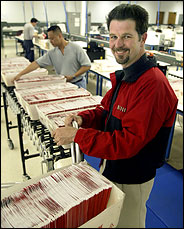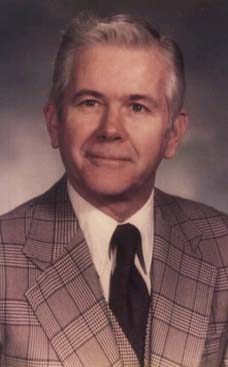
"If the Starbucks secret is a smile when you get your latte," says Netflix CEO Reed Hastings, "ours is that the Web site adapts to the individual's taste." Never mind the buzzwords. What they mean is that each time you go to the site, your experience is truly tailored to you, and it's one you helped fashion. "Our warehouse employees never interact directly with the customer, so what we focus on instead is having the Web site be the most personalized Web site in the world," says Hastings. "If the Starbucks secret is a smile when you get your latte, ours is that the Web site adapts to the individual's taste." Even Amazon, which does personalization so well, doesn't consider reviews of past purchases when giving recommendations, says Leslie Kilgore, Netflix's CMO and a former Amazon staffer. Plus, says Hastings, Netflix's model, which lets users cancel at any time, means "once you subscribe, our interest is purely your happiness." Businessman and Internet Visionary Reed Hastings of California, the founder of Netflix, served as a Peace Corps Volunteer in Swaziland.
Netflix CEO Reed Hastings says "It's better to control our own destiny"
High-tech Achiever: Netflix
At Netflix, the secret sauce is software.
From: Issue 99 | October 2005 | Page 48 By: Jena McGregor Photographs by: Ture Lillegraven
The starring role in Netflix's customer-experience strategy goes to its top-secret, highly customized technology, which offers its more than 3 million customers their own personal box office. We peek behind the scenes at our Oscar-worthy Customers First Award winner.
The last DVD Reed Hastings watched was Iron Jawed Angels, the HBO movie about the women's suffrage movement starring Hilary Swank and Anjelica Huston. Right now, Hastings, the founder and CEO of Netflix, the online DVD subscription service, has seven movies at home, ranging from Z Channel, a documentary about the first pay-cable channel, to the cult phenom Donnie Darko. He loved chick flick Fried Green Tomatoes but hated the Guy Ritchie heist film Lock, Stock and Two Smoking Barrels. Go figure.
I know all of this because Reed Hastings and I are friends. Well, sort of. In August, Hastings invited me to view his "queue," or the list of movies he wants Netflix to mail him. More specifically, he asked me to join "Friends," a growing network of Netflix users. This feature, which launched in January, lets users peek at what movies their friends are watching--I'll show you mine if you show me yours--what movies their friends loved or hated, and their friends' movie reviews. (Reed on Iron Jawed Angels?: "Moving. Intense. Inspiring.")
The Friends network gives Netflix a way to more deeply engage customers in its service. But someday, it may also help Netflix detect possible spikes in movie demand so that it can avoid DVD shortages. People with lots of friends, after all, have the ability to affect a lot of movie watching.
Friends is just one of many ways online DVD pioneer Netflix is building on its technology roots to continue enhancing the customer experience. Over the second half of this year, the company plans to spend $8 million to further automate its already high-tech distribution centers in order to keep costs low and further speed up shipping times. Last fall, the company introduced RSS feeds, automatically sending customers updates on new releases or account changes. And in January, doing its part to promote world household peace, Netflix programmed its software so that single accounts can have multiple "profiles." Family members can now create their own separate queues, giving Die Hard and Divine Secrets of the Ya-Ya Sisterhood equal-opportunity rotations in the living room.
A Companywide Focus
It's no surprise, then, that Netflix is the winner in our High-Tech Achiever category. But Netflix was our overall winner, too, with a recommendation score topping 90%. (Netflix also triumphed over Wal-Mart this year. In what may be a first, the giant retailer gave up on its DVD rental service in May, directing its customers to Netflix. In exchange, Netflix will point its users to Wal-Mart for DVD purchases.)
In fact, Netflix's companywide focus on the customer experience could make it a candidate in any of our five categories--and a source of ideas for any company looking for smart ways to cozy up to customers. The Friends network and profile capabilities, for example, are testaments to how well Netflix listens to customers: Each was added in response to consumer demand. Not a week goes by that the company doesn't play host to several focus groups to get feedback on site innovations.
Netflix could be called an employee innovator, too. Warehouse workers--those closest to the customer--get free Netflix subscriptions and DVD players in order to understand what customers go through when Finding Nemo doesn't arrive in time for their kid's birthday party. Corporate employees stay happy--and therefore eager to solve tough engineering problems to improve the user experience--with perks like no hard limits on vacation time and free trips to Sundance each January.
Profits are up--second-quarter earnings were almost double those from the same period last year--in part thanks to one of Netflix's lowest customer churn rates ever, just 4.7%. That low churn rate, the company says, is helped by investments in greater selection (Netflix's library increased 20% in the second quarter, to more than 50,000 titles) and four new distribution centers that shorten some shipping times.
Finally, while Hastings, 44, is hardly the humble "I'm Reed in customer service" sort--rather, he plays the role of the cocksure Silicon Valley entrepreneur quite well--he does lead from a customer-centered perspective. When Netflix delayed its IPO in the midst of 2000's dotcom bust, for example, Hastings reminded his troops of their mission. " 'Tomorrow when you come to work, if it doesn't make the customer happy, move the business forward, and save us money, don't [do it],' " recalls chief talent officer Patty McCord. "Anything we're doing has to meet all three criteria."
Simple Surface, Complex System
All that said, the biggest star in Netflix's customer-experience script is its technology, even if it's been cast in a nonspeaking role. Most customers see Netflix, which Hastings founded in 1997 after forking over $40 in late fees for Apollo 13, as a convenient Web service that quickly delivers by mail movies they can keep as long as they want. But underlying that simple surface is a vast and complex software system that uses more than a million lines of code to compute who gets what movie next, which movies will be in demand, and, most important, which films to recommend to you.
That recommendation software, called Cinematch, urges customers to go through a rating exercise, tuning the system to find movies they will like. The more movies you rate, the more accurate your recommendations will become. "It's like your own personal box office," says Kelly Mooney, president of Resource Interactive, an online customer-experience consulting firm. "It's almost as if they keep delivering more value for the same price every month."
"If the Starbucks secret is a smile when you get your latte," says Netflix CEO Reed Hastings, "ours is that the Web site adapts to the individual's taste."
In a sense, Cinematch is one-to-one, mass-customized, cocreated customer-relationship management, all rolled into one. Never mind the buzzwords. What they mean is that each time you go to the site, your experience is truly tailored to you, and it's one you helped fashion. "Our warehouse employees never interact directly with the customer, so what we focus on instead is having the Web site be the most personalized Web site in the world," says Hastings. "If the Starbucks secret is a smile when you get your latte, ours is that the Web site adapts to the individual's taste." Even Amazon, which does personalization so well, doesn't consider reviews of past purchases when giving recommendations, says Leslie Kilgore, Netflix's CMO and a former Amazon staffer. Plus, says Hastings, Netflix's model, which lets users cancel at any time, means "once you subscribe, our interest is purely your happiness."
When customers use Netflix's recommendation software (and they do--about 60% of all movies added to queues come from recommendations), it creates a virtuous circle for Netflix and customers alike. Members are introduced to new movies and run less of a risk of wasting time on a film they won't enjoy. (Netflix says people who put movies in their queue from the new-release page or top-100 list tend to give them lower ratings.) Plus, because Netflix avoids suggesting out-of-stock films, it gets to maximize its inventory, and you're less frequently stuck wanting a movie that can't be sent.
Netflix, as you can imagine, is tight-lipped about Cinematch and how it works. ("That's proprietary" is a favorite refrain.) What it will say is that Cinematch has a database of over half a billion movie ratings and takes in more than a million new ones every day.
Homemade
Netflix can be so private about its technology because most of it was built in-house. Netflix invented online DVD rental, after all, and few off-the-shelf systems suit its needs. But it's also a matter of knowing it can do better. This is largely a company of geeks who love movies, not the other way around. (Hastings might even be called an über geek: His last company wrote software for software developers. Before getting his master's in computer science at Stanford, Hastings was a Peace Corps math teacher in Swaziland.) "It's better to control our own destiny," he says.
Netflix even built its own customer-support software a few years ago. The new system has a simple interface that gives reps a quick read on when DVDs were shipped or received. As part of a recent upgrade, 10 senior reps will get alerts that ask them to look into how a customer call might have been prevented. At times, reps will be prompted to call the customer back and interview him or her.
Hastings brags that during Netflix's early days, it had 115,000 customers and 100 support reps. Today, the company has 3.2 million customers; their questions are handled by just 43 reps. "You read a lot about outsourcing of customer support--send it to India, save $3," he says. "That's totally uninteresting to us. We're focused on higher leverage--avoiding issues and fixing them at their root cause."
That ratio is impressive, to be sure, but the fact that Netflix's customer-support number is deeply buried on the site certainly keeps those numbers down. (Can't find it? It's 888-NETFLIX.) That's one of a few glaring flaws in Netflix's experience--having to dig for a company's phone number on its Web site feels so 1997. Hastings doesn't agree. "It hits the right balance of customer satisfaction and cost," he says.
Amazon and Other Threats
Another problem for Netflix is its relationship with high-volume renters. These highly vocal customers, who aren't profitable for Netflix, believe the company is intentionally slowing down the pace at which it sends them movies, a practice these users call "throttling." Hastings says these film buffs do get lower priority than low-volume members if Netflix is in short supply of a DVD or if one of the warehouses gets overwhelmed with demand. But he denies any other penalizing of these members. "We're not saying they're bad because they watch a lot of movies," says Hastings. "God bless them, that's fine. But if we run short, it makes more sense to give it to the people [who haven't watched as many]."This group isn't the only challenge Hastings faces. Blockbuster Online, which launched last August, is growing quickly. Although the me-too service isn't yet profitable--and its corporate parent is badly ailing, losing $57 million in the second quarter--it added about the same number of subscribers as Netflix during the second quarter. Blockbuster gives away free in-store rental coupons, has begun using its stores as mini distribution centers, and is rolling out its own recommendation engine. A site redesign is planned for early 2006, and the company is looking into community features that may connect friends and family.
Even though Wal-Mart is out of the picture, Amazon could still enter the market, too. And as the game shifts to video on demand in the coming years, Netflix's competition will change again. The company plans to launch a video-on-demand test service by the end of the year, but Hastings warns it will be "underwhelming" because of limited downloadable movies. The service will help deliver movies to set-top boxes in the living room more easily than current download services like Movielink or CinemaNow, but the cable companies, which already have their own versions of video on demand, will fight to remain kings of the couch. And then there's the Jobs factor: Could Apple work its magic with movie downloads, too?
For now, though, Netflix looks to be in the director's chair. "It's Netflix's market to lose," says Mario Cibelli, portfolio manager at Marathon Partners, which owns Netflix in its fund. "The best companies continue to innovate and listen to their customers and come up with things they'll like. I think that's how Netflix operates."
That's evident one recent Friday on the grounds outside Netflix's Los Gatos, California, headquarters. About 150 or so employees, many in black T-shirts reading What's in your queue?, are waiting to feast on pasta salads, hamburgers, and Indian samosas (potluck, mind you--even the food here is homemade). The cause for celebration: signing up 10% of Netflix's subscribers to the Friends network.
Friends product director Chris Darner stands up to speak. "I'd like to thank . . ." he begins, naming a list of folks who helped his team move from "sneak peek" (Netflix's customer-friendly phrase for "beta") to "prime time." "So this is sort of like Oscar night?" Hastings says from the back. Everyone laughs, but Darner has one more name to thank. "Last but not least, I want to thank the customers. We did this for them, and I wish all 300,000 of them could be here. We certainly have enough food!" With more than 50,000 DVDs and a buffet of customer-focused innovations, Netflix's customers should continue to stay well-fed indeed.












